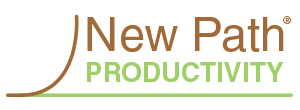|
[3 Minute Read or Listen Below] I have a close friend who is struggling. About three months ago, she started a new job that has taken her way outside her comfort zone. A contributor to this struggle is that the job description wasn't accurate in conveying her duties. But we'll leave that inaccuracy for another discussion. My focus today is the even more significant reason for her struggle - her negative self-talk. My friend is intelligent, progressive-thinking, resourceful, and extremely capable. To hear her describe herself, you would think she's talking about a completely different person. Often, the hardest sell is convincing ourselves of our attributes. More often, we focus on our perceived negatives.
How many of us have convinced ourselves we can't have an organized office? Or that becoming more productive is out of our reach? I know one thing for sure: if we think we can't and give up trying, our prediction comes true 100% of the time.
This kind of negative self-talk diminishes our ability to make positive changes and undermines our confidence. Not that we should overinflate our egos and bury our heads in the sand to our limitations. But we need more objectivity, positivity, and patience. Self-talk creates a feedback loop that affects our heart health, mood, motivation, and anxiety. I read once that researchers estimate we think in the neighborhood of 50,000 to 70,000 thoughts a day, and about 80% of those thoughts are negative! We say things to ourselves we would never say to others. How do we break the pattern of negative self-talk? First, we have to be aware we're doing it. Negative self-talk can be a defense mechanism. We often find it comforting to justify our negativity or lack of progress. But most often, we're just making excuses. When we start paying attention, we recognize these thoughts don't serve us, and they keep us stuck. Once we acknowledge our negative self-talk and its detrimental effect, we must have a plan to respond. It's probably too far to leap in with statements of wild positivity. If our response is too far-fetched, our brain will reject it. Instead, moving to a more neutral state of mind may be better. We need to show ourselves grace and develop an internal dialogue that comforts and inspires us. Creating a strengths inventory or a list of what makes us happy can help redirect our thoughts. When we feel negativity creeping in, we can pull these out, read them (and re-read them) until our focus changes. What's most important is not to wallow in the negativity. That is precisely what it wants! Focus on objectivity, the facts, and data, to soften the emotions of a negative state. We must be patient with ourselves. Suppose you are balance-challenged like me and have ever attempted tree pose during a yoga practice. Then you know the importance of patience (and a good sense of humor). Amanda Kohr's blog entry on Yoga International about the subject is fantastic. She says, "The real growth of a tree occurs over the course of many months and years. I try to remember this when I'm stressing over my inability to tackle certain poses or when I feel as though I'm not as far in my career as I'd like to be. Sometimes we get so hungry for growth that we forget growing is a process. A tree doesn't grow three feet in a day, but that doesn't mean it's not growing....if you find yourself attempting something new...and you can't get it right away, understand that you are still moving forward every time you try." As for my friend, I will continue to try and strengthen her belief in her abilities and support her whenever she needs me. Is she in the best possible role for herself right now? Probably not, but she has a lot to offer the company. I don't want to see her give in to negative self-talk before realizing her full potential. If she chooses to leave for a new role she feels is a better fit, I will still be her biggest cheerleader. Is negative self-talk holding you back from being more organized and productive? Let's flip that script together! Click here to complete your Productive Environment Scorecard™. The Productive Environment Scorecard™ ©2005-2021 Productive Environment Institute | Used under license to Kathy Muzik
0 Comments
Your comment will be posted after it is approved.
Leave a Reply. |
Kathy Muzik
|
New Path Productivity®, LLC provides worldwide virtual and Chicagoland onsite services for individuals and businesses to increase productivity
through organization and management of resources (e.g., energy, information, people, processes, space, and time).
through organization and management of resources (e.g., energy, information, people, processes, space, and time).
|
|
Phone847.748.0144
|
AddressPO Box 162
Highland Park, IL 60035 |
Privacy Policy Terms of Use
New Path Productivity®, LLC © 2015 - 2024 All Rights Reserved
New Path Productivity®, LLC © 2015 - 2024 All Rights Reserved



 RSS Feed
RSS Feed
